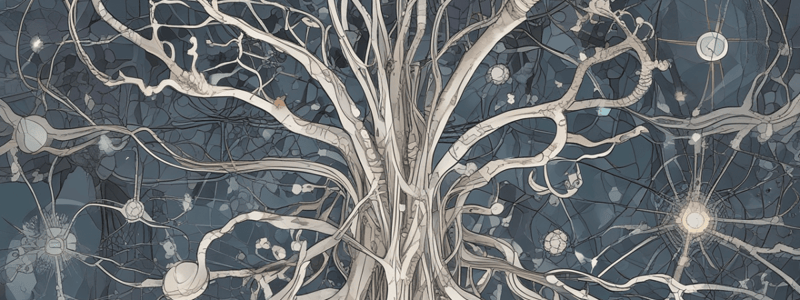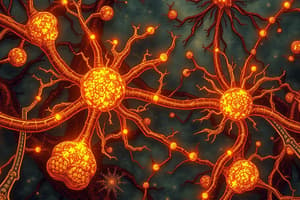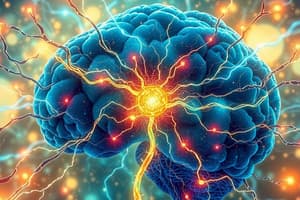Podcast
Questions and Answers
What is the outcome of Na+ influx in the postsynaptic cell?
What is the outcome of Na+ influx in the postsynaptic cell?
- Action potential formation
- Hyperpolarization of the membrane
- No change in the membrane potential
- Depolarization of the membrane (correct)
What type of post-synaptic potential is produced by Cl- flux out of the postsynaptic cell?
What type of post-synaptic potential is produced by Cl- flux out of the postsynaptic cell?
- Inhibitory post-synaptic potential (IPSP) (correct)
- Mixed potential
- Excitatory post-synaptic potential (EPSP)
- No potential change
What is the function of the enzyme acetylcholinesterase (AChE) in the synaptic cleft?
What is the function of the enzyme acetylcholinesterase (AChE) in the synaptic cleft?
- To release acetylcholine into the synaptic cleft
- To synthesize acetylcholine
- To cleave acetylcholine into choline and acetate (correct)
- To transport acetylcholine into the postsynaptic cell
What is the role of EAATS in the synaptic cleft?
What is the role of EAATS in the synaptic cleft?
What is the effect of blocking acetylcholine in the basal forebrain cholinergic system (BFCS)?
What is the effect of blocking acetylcholine in the basal forebrain cholinergic system (BFCS)?
What is the function of choline acetyltransferase in the presynaptic terminal?
What is the function of choline acetyltransferase in the presynaptic terminal?
What type of post-synaptic potential is produced by K+ efflux from the postsynaptic cell?
What type of post-synaptic potential is produced by K+ efflux from the postsynaptic cell?
What is the effect of drugs that block the reuptake of neurotransmitters?
What is the effect of drugs that block the reuptake of neurotransmitters?
What is the main neurotransmitter in the parasympathetic nervous system?
What is the main neurotransmitter in the parasympathetic nervous system?
Which type of acetylcholine receptors are ionotropic?
Which type of acetylcholine receptors are ionotropic?
What is the role of glial cells in neurotransmitter clearance?
What is the role of glial cells in neurotransmitter clearance?
What is the primary location of dopaminergic neurons in the midbrain?
What is the primary location of dopaminergic neurons in the midbrain?
Which of the following is NOT a location of noradrenergic cells?
Which of the following is NOT a location of noradrenergic cells?
What is the function of acetylcholinesterase in the synaptic cleft?
What is the function of acetylcholinesterase in the synaptic cleft?
Which type of serotonin receptors is associated with inhibiting pain pathways in the spinal cord?
Which type of serotonin receptors is associated with inhibiting pain pathways in the spinal cord?
What is the effect of acetylcholine on the heart?
What is the effect of acetylcholine on the heart?
Which of the following is NOT a location of dopamine receptors?
Which of the following is NOT a location of dopamine receptors?
What is the effect of noradrenaline on mood and concentration?
What is the effect of noradrenaline on mood and concentration?
What is the function of the dopamine transporter (DAT)?
What is the function of the dopamine transporter (DAT)?
Which of the following is associated with low serotonin activity?
Which of the following is associated with low serotonin activity?
What is the primary function of reuptake transporters in the synaptic process?
What is the primary function of reuptake transporters in the synaptic process?
What is the primary purpose of the synaptic cleft?
What is the primary purpose of the synaptic cleft?
What is the result of depolarization of the presynaptic terminal?
What is the result of depolarization of the presynaptic terminal?
What is the difference between fast and slow neurotransmission?
What is the difference between fast and slow neurotransmission?
What is the primary function of calcium ions in the synaptic process?
What is the primary function of calcium ions in the synaptic process?
What is the purpose of specific enzymes in the synaptic process?
What is the purpose of specific enzymes in the synaptic process?
What is the primary way serotonin is removed from the synaptic cleft?
What is the primary way serotonin is removed from the synaptic cleft?
What is the primary source of glutamate in the CNS?
What is the primary source of glutamate in the CNS?
What is the function of the excitatory amino acid transporters in glutamate clearance?
What is the function of the excitatory amino acid transporters in glutamate clearance?
What is the effect of GABA antagonists on the nervous system?
What is the effect of GABA antagonists on the nervous system?
What is the primary function of GABA in the nervous system?
What is the primary function of GABA in the nervous system?
What is the effect of a GABA agonist on the nervous system?
What is the effect of a GABA agonist on the nervous system?
What is the primary mechanism of glutamate clearance in the CNS?
What is the primary mechanism of glutamate clearance in the CNS?
What is the effect of tiagabine on GABAergic neurotransmission?
What is the effect of tiagabine on GABAergic neurotransmission?
What is the primary function of the GABA and glycine transporters?
What is the primary function of the GABA and glycine transporters?
What is the effect of alcohol on GABAergic neurotransmission?
What is the effect of alcohol on GABAergic neurotransmission?
Flashcards are hidden until you start studying
Study Notes
Neurotransmission
- Neurotransmitters bind to receptors on the postsynaptic cell, inducing a specific effect on the postsynaptic potential.
- Ion flow across the postsynaptic membrane leads to graded changes in membrane potential (voltage).
Post-Synaptic Potentials (PSPs)
- Excitatory Post-Synaptic Potential (EPSP): voltage changes that enhance the likelihood of an action potential forming.
- Inhibitory Post-Synaptic Potential (IPSP): voltage changes that reduce the likelihood of an action potential being produced.
- Na+ and Ca++ influx always produce an EPSP (depolarization of the membrane).
- K+ efflux always produces an IPSP (hyperpolarization of the membrane).
- Cl- flux (in or out) typically produces an IPSP (hyperpolarization of the membrane).
Neurotransmitter Clearance
- Neurotransmitters can be returned to the axon terminal for reuse or transported into glial cells.
- 2 enzymes inactivate neurotransmitters.
- Neurotransmitters can diffuse out of the synaptic cleft.
Acetylcholine (ACh)
- Synthesized in the presynaptic terminal from choline and acetyl-CoA.
- Released into the synaptic cleft, where it is rapidly split into acetate and choline by the enzyme cholinesterase.
- Choline is actively transported back into the presynaptic terminal to be used again for ACh synthesis.
- ACh has two types of receptors: muscarinic and nicotinic.
- ACh is the main neurotransmitter in the parasympathetic nervous system, regulating bodily functions such as heart rate, digestion, and secretion of saliva and bladder function.
Dopamine Pathway
- Dopaminergic neurons are primarily located in the midbrain.
- Two pathways: Nigrostriatal Pathway and Mesocorticolimbic Pathway.
- Involved in motor control, reward, and addiction.
- Dopamine receptors are metabotropic, with five types: D1, D2, D3, D4, and D5.
Noradrenaline (NA) Pathway
- Noradrenergic cells located in the pons and medulla.
- Involved in vigilance, alertness, and arousal.
- NA receptors are metabotropic, with four types: α1, α2, β1, and β2.
Serotonin (5-HT) Pathway
- Mainly secreted by nuclei in the median raphe of the brain stem.
- Involved in regulating mood, sleep, and appetite.
- 5-HT receptors are metabotropic, with seven types: 5-HT1, 5-HT2, 5-HT3, 5-HT4, 5-HT5, 5-HT6, and 5-HT7.
Glutamate Pathway
- The principal excitatory neurotransmitter in the CNS.
- Synthesized in neurons and glial cells.
- Involved in memory, learning, and synaptic plasticity.
- Glutamate receptors are ionotropic and metabotropic.
GABA (Gamma-Amino Butyric Acid) Pathway
- The major inhibitory neurotransmitter in the CNS.
- Involved in regulating anxiety, sleep, and muscle relaxation.
- GABA receptors are ionotropic and metabotropic.
GABA Clearance
- Like glutamate, GABA action is terminated by either reuptake into the presynaptic terminal and packaging in synaptic vesicles or through transport into glial cells where breakdown can occur.
- The GABA transporter uses the sodium electrochemical gradient to drive the movement of the transmitter across the membrane.
Studying That Suits You
Use AI to generate personalized quizzes and flashcards to suit your learning preferences.




